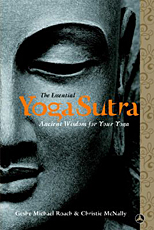The Yoga Sutra by Patanjali is a Sanskrit classic sacred text consisting of 195 "threads" or aphorisms that delineate the process of liberation through yoga. There are four parts of this important Eastern primer: absorption, practice, supernatural powers, and liberation. This version has been translated by Geshe Michael Roach, one of the most respected teachers of Tibetan Buddhism in America, and Christie McNally, a translator and teacher of ancient Tibetan and Sanskrit texts. Roach, the author of The Diamond Cutter provides commentary on the threads that discuss the philosophy and practice of yoga.
Here you will find material on the mistakes made by the mind, the impermanence of the world and everything in it, the difficulty in speaking the truth, the importance of not stealing, and the kindness that brings happiness to others. One of our favorite passages is by Roach. He describes a situation. We enter a donut shop and notice there is only one maple-coated donut left. We begin to "grasp," which doesn't mean grabbing it or even wanting it, just looking at it a certain way. "Spiritually advanced people enjoy things like donuts a lot more than we can. The very ability to like and dislike is what gets us enlightened: I like peace, I don't like pain, I dislike seeing people suffer." However, Roach continues, there is a difference between smart liking and stupid liking. How do we tell them apart?
"Here's a test. An elderly lady behind you says to her husband, 'Maple's my favorite!' Do you like the donut enough to leave it for her?"
